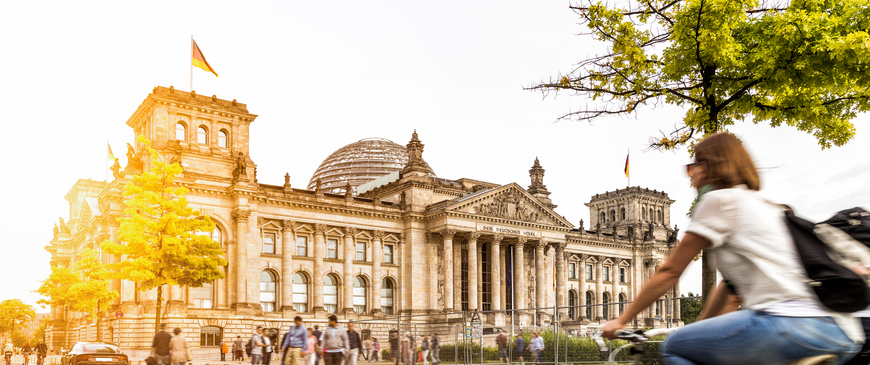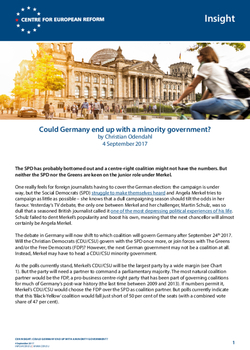
Could Germany end up with a minority government?
The SPD has probably bottomed out and a centre-right coalition might not have the numbers. But neither the SPD nor the Greens are keen on the junior role under Merkel.
One really feels for foreign journalists having to cover the German election: the campaign is under way, but the Social Democrats (SPD) struggle to make themselves heard and Angela Merkel tries to campaign as little as possible – she knows that a dull campaigning season should tilt the odds in her favour. Yesterday's TV debate, the only one between Merkel and her challenger, Martin Schulz, was so dull that a seasoned British journalist called it one of the most depressing political experiences of his life. Schulz failed to dent Merkel's popularity and boost his own, meaning that the next chancellor will almost certainly be Angela Merkel.
The debate in Germany will now shift to which coalition will govern Germany after September 24th. Will the Christian Democrats (CDU/CSU) govern with the SPD once more, or join forces with The Greens and/or the Free Democrats (FDP)? However, the next German government may not be a coalition at all. Instead, Merkel may have to head a CDU/CSU minority government.

As the polls currently stand, Merkel's CDU/CSU will be the largest party by a wide margin (see Chart 1). But the party will need a partner to command a parliamentary majority. The most natural coalition partner would be the FDP, a pro-business centre-right party that has been part of governing coalitions for much of Germany's post-war history (the last time between 2009 and 2013). If numbers permit it, Merkel's CDU/CSU would choose the FDP over the SPD as coalition partner. But polls currently indicate that this 'Black-Yellow' coalition would fall just short of 50 per cent of the seats (with a combined vote share of 47 per cent).

It will be difficult for the CDU/CSU and FDP to rise much further in the polls before the election. So far, the SPD and the Greens have struggled to mobilise their voters. The reason is that their policies are perceived as too close to the policies of the current, Merkel-led 'Grand Coalition' government with the SPD. And yesterday's TV debate only reinforced that perception. But that could change if the election looked like producing a CDU/CSU-FDP coalition. In that case, the SPD and the Greens would be able to highlight policy differences, especially with regard to the FDP. That would mobilise their voters and limit a further rise of the CDU/CSU-FDP in the polls.
If the numbers do not allow a black-yellow coalition, there are two coalition options: a continuation of the grand coalition or a CDU/CSU-led ‘Jamaica Coalition’ – named after the country’s flag colours – with the FDP and the Greens. Neither option is appealing to the centre-left junior partner involved.
A Jamaica coalition would be a first at the federal level, though there are CDU-Green coalitions at the state level, and even one Jamaica coalition in the northern-most state, Schleswig-Holstein. The FDP would probably agree to such a coalition, even though it is not exactly popular among voters (see Chart 3). The problem is that it would bring the intra-party conflicts among the Greens to a head.

The Greens have always been divided between a more fundamentalist left wing, and pragmatists like former vice-chancellor Joschka Fischer who helped to get them into power. But they managed to stay united for political expedience. More recently, the party has been split over which direction to take: become a sort of eco-CDU, following Winfried Kretschmann, the party's most successful leader and only Green state prime minister in the CDU's heartland, Baden-Württemberg; or maintain its left-wing credentials and remain a green version of the social democrats. A coalition with Merkel and the FDP would cement the party’s shift in the former direction, but alienate many of its left-leaning voters and members. The fate of the LibDems in the UK certainly acts as a warning. The left wing of the Greens would probably fiercely resist a Jamaica coalition.
That leaves a renewal of the grand coalition between the CDU/CSU and the SPD. However, the SPD may well refuse to enter another grand coalition and join the opposition ranks instead. After the 2005-2009 grand coalition, the SPD lost heavily at the polls. The lesson the party drew from that defeat was to only enter another grand coalition if the policies of the resulting government had a very clear social-democratic agenda. Alas, it does not seem to have helped: while the current grand coalition implemented many of the SPD's policies, voters do not seem to give the SPD much credit. Meanwhile, even a coalition outsider like Martin Schulz has a hard time campaigning against a government that his own party is a part of, as yesterday's TV debate clearly showed. The SPD will certainly think twice before entering into another coalition with Merkel, and many party members will resist it.
If neither the Greens nor the SPD agree to a coalition with the CDU/CSU, will there have to be new elections? Not necessarily. Merkel could also form a minority government, supported by all three, the FDP, the Greens and the SPD. This would be a first at the federal level, and would make governing a lot harder for her, as she would have to find changing majorities for her policies.
In times of crises, however, she would be able to count on the FDP, the Greens and the SPD to back her – as the SPD did for example during the euro crisis, when Merkel's black-yellow coalition at the time failed to get a majority for the second Greece bailout. A minority government would also allow the Greens, the SPD and also the FDP to maintain an independent profile, and its leaders to fight the CDU/CSU from the opposition benches in 2021.
Is a minority government the most likely outcome? There is a reason why Germany's most famous campaign slogan of all time is Konrad Adenauer's 1957 slogan Keine Experimente (no translation necessary): in the end, the German voter wants politics to be boring but stable. That may well prevent a Merkel minority government, as the SPD, despite the fierce resistance among its members, will (have to) agree to another grand coalition, or risk losing political support in the middle. After all, a grand coalition remains the most popular among German voters, together with a black-yellow coalition (see Chart 3 above).
That is good news for Europe in the short term: it promises a reliable and well-known government, which would pursue consensus policies, both at home and abroad. But in the long term, another grand coalition would undermine German democracy, and ultimately Europe, too. The Merkel years have been a time of crises, but were largely void of serious democratic deliberation, and yesterday's TV debate showed that clearly. Germany has no vision of its future, hardly a European agenda to speak of, little awareness of its strategic and security interests, and no ambition to shape the world economy or trade agenda. Given how central Germany is to many of the challenges facing Europe, from economics to security, another bland grand coalition would be bad news.
Christian Odendahl is chief economist at the Centre for European Reform.


Add new comment